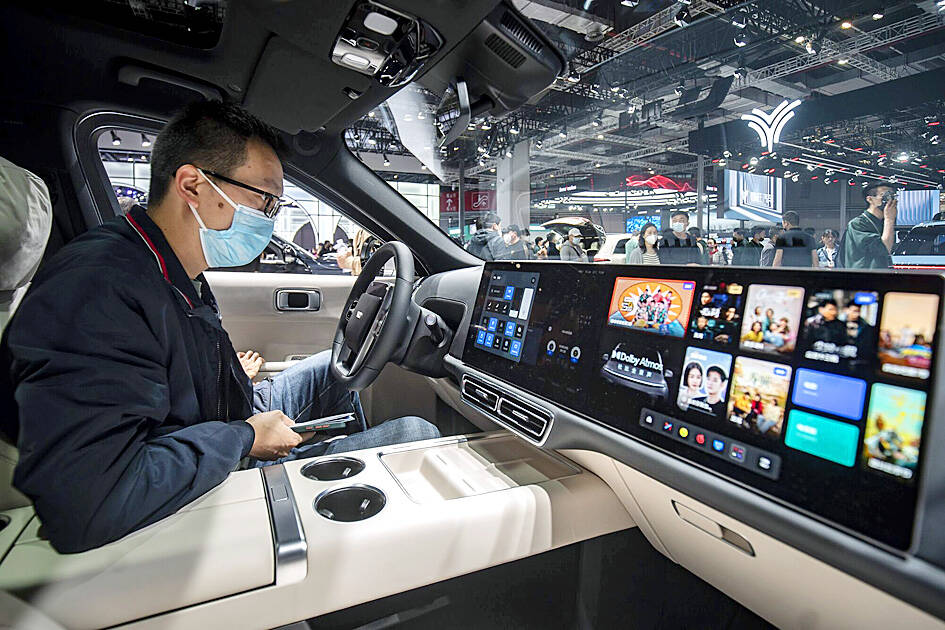Shares of Chinese electric vehicle (EV) maker Li Auto Inc (理想汽車) have more than doubled from last year’s low and are tipped for further gains even as a slowing economy and price war hamper its rivals.
The Beijing-based automaker unexpectedly reported profits for the past two quarters by churning out a regular lineup of new models and keeping costs contained.
Analysts remain bullish: Citigroup Inc predicts the firm’s shares would climb another 88 percent by the end of the year, while Morgan Stanley raised its price target by more than 40 percent this month.

Photo: Bloomberg
Li Auto has outpaced its peers by introducing a new model in each quarter since the middle of last year, much faster than competitors such as XPeng Inc (小鵬汽車) and Nio Inc (蔚來汽車). The revamped product lineup helped revenue surge by 96 percent last quarter, while deliveries rose to a record 52,584.
“The order intake has been much stronger than the market had expected, thanks partly to the intensive model launches,” said Joanna Chen, an analyst at Bloomberg Intelligence in Hong Kong. “Li Auto’s sales volume will continue to beat XPeng and Nio this year, as the latter are still in a phase of product switch.”
Li Auto’s Hong Kong-listed shares closed at HK$112 yesterday, having climbed from last year’s low of HK$53.55 set on Oct. 31. Their 109 percent rally over the period compares with a 23 percent gain in Xpeng, and a 19 percent loss for Nio.
A price war is heating up in China’s EV industry as the costs of batteries fall from last year’s highs. Tesla Inc and BYD Co (比亞迪) have both announced plans to cut vehicle prices, effectively squeezing industry margins, although analysts see Li Auto ideally positioned to weather the intensifying competition.
The price wars are mainly in the mass-market segment around a selling price of 100,000 yuan to 150,000 yuan (US$14,122 to US$21,183), “but Li Auto is selling cars far above that range,” said Vincent Sun, an analyst at Morningstar Asia Ltd in Singapore. “Secondly, if you look across the board, there are actually not too many models to choose in mid-to-large-sized premium SUVs [sport utility vehicles].”
Unlike its rivals, Li Auto has focused on designing and manufacturing extended-range electric vehicles, which use gasoline engines to add to the distance possible for their electric motors.
The company is also expected to introduce its first purely electric-powered vehicle later this year to complement its existing range of hybrid cars.

TAKING STOCK: A Taiwanese cookware firm in Vietnam urged customers to assess inventory or place orders early so shipments can reach the US while tariffs are paused Taiwanese businesses in Vietnam are exploring alternatives after the White House imposed a 46 percent import duty on Vietnamese goods, following US President Donald Trump’s announcement of “reciprocal” tariffs on the US’ trading partners. Lo Shih-liang (羅世良), chairman of Brico Industry Co (裕茂工業), a Taiwanese company that manufactures cast iron cookware and stove components in Vietnam, said that more than 40 percent of his business was tied to the US market, describing the constant US policy shifts as an emotional roller coaster. “I work during the day and stay up all night watching the news. I’ve been following US news until 3am

UNCERTAINTY: Innolux activated a stringent supply chain management mechanism, as it did during the COVID-19 pandemic, to ensure optimal inventory levels for customers Flat-panel display makers AUO Corp (友達) and Innolux Corp (群創) yesterday said that about 12 to 20 percent of their display business is at risk of potential US tariffs and that they would relocate production or shipment destinations to mitigate the levies’ effects. US tariffs would have a direct impact of US$200 million on AUO’s revenue, company chairman Paul Peng (彭雙浪) told reporters on the sidelines of the Touch Taiwan trade show in Taipei yesterday. That would make up about 12 percent of the company’s overall revenue. To cope with the tariff uncertainty, AUO plans to allocate its production to manufacturing facilities in

Six years ago, LVMH’s billionaire CEO Bernard Arnault and US President Donald Trump cut the blue ribbon on a factory in rural Texas that would make designer handbags for Louis Vuitton, one of the world’s best-known luxury brands. However, since the high-profile opening, the factory has faced a host of problems limiting production, 11 former Louis Vuitton employees said. The site has consistently ranked among the worst-performing for Louis Vuitton globally, “significantly” underperforming other facilities, said three former Louis Vuitton workers and a senior industry source, who cited internal rankings shared with staff. The plant’s problems — which have not

COLLABORATION: Given Taiwan’s key position in global supply chains, the US firm is discussing strategies with local partners and clients to deal with global uncertainties Advanced Micro Devices Inc (AMD) yesterday said it is meeting with local ecosystem partners, including Taiwan Semiconductor Manufacturing Co (TSMC, 台積電), to discuss strategies, including long-term manufacturing, to navigate uncertainties such as US tariffs, as Taiwan occupies an important position in global supply chains. AMD chief executive officer Lisa Su (蘇姿丰) told reporters that Taiwan is an important part of the chip designer’s ecosystem and she is discussing with partners and customers in Taiwan to forge strong collaborations on different areas during this critical period. AMD has just become the first artificial-intelligence (AI) server chip customer of TSMC to utilize its advanced